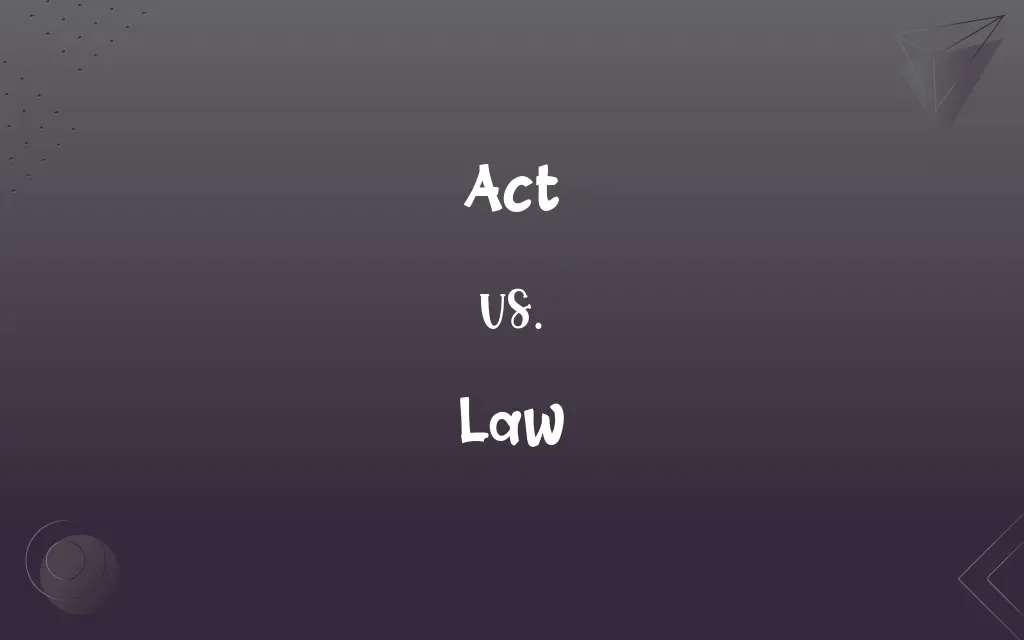Act vs. Law: What's the Difference?
Edited by Aimie Carlson || By Harlon Moss || Updated on October 26, 2023
An act is a formal decision or legislation by a governing body, while a law is a system or collection of rules enforced by authority.

Key Differences
An act, within the context of government and legislation, refers to a formal decision or a piece of legislation that has been approved by a governing body. This means that an act represents the process of enacting and the result of deliberate decision-making by elected officials. Conversely, a law represents the finalized rule or set of rules that must be followed by the members of a particular society or community. A law comes into effect after an act is passed and often serves as a guideline for conduct and behavior.
Both the act and law are central to the operation of modern democracies. An act, once passed, signals the intent of the governing body and reflects the collective will of elected officials. Law, on the other hand, serves as the tangible expression of that intent. It provides specific rules and guidelines, ensuring consistency and fairness within the society it governs.
It's essential to recognize that while every law originates from an act, not every act necessarily becomes a law. This is because an act might face challenges or modifications before becoming a universally recognized law. Both act and law are crucial in understanding the evolution and operation of legislative procedures in various governmental systems.
To put it more succinctly, while an act represents the formulation and decision-making process, a law symbolizes the concrete set of rules that emerge from such deliberations. Both are indispensable in the context of governance, with the act serving as the precursor and the law as the culmination of the legislative process.
Comparison Chart
Definition
A formal decision by a governing body.
A system or collection of rules enforced by authority.
ADVERTISEMENT
Origin
Comes from legislative decision-making.
Comes into effect after an act is passed.
Status
Not every act becomes a law.
Represents finalized rules of society.
Function
Reflects intent of the governing body.
Provides specific rules and guidelines.
Relationship
Serves as the precursor in legislation.
Culmination of the legislative process.
Act and Law Definitions
Act
One of the main divisions of a play or opera.
The drama intensified in the second act.
ADVERTISEMENT
Law
A statement describing a consistent relationship observed to be universally true.
The law of gravity defines how objects are attracted to one another.
Act
A formal decision by a legislative body.
Congress passed a new act regarding health care.
Law
A rule defining correct procedure or behavior in a sport.
According to the law of the game, that move was illegal.
Act
The process of doing or performing something.
It's all an act; she isn't genuinely upset.
Law
A rule established by authority.
The law states you must wear a seatbelt while driving.
Act
To behave in a certain manner.
He acted surprised when he received the news.
Law
A field of study or profession.
She decided to go to school for law.
Act
A behavior or deed.
Her act of kindness made my day.
Law
The whole system or set of rules made by the government.
He's studying the law to become a lawyer.
Act
The process of doing or performing something
The act of thinking.
Law
A rule of conduct or procedure established by custom, agreement, or authority.
FAQs
What's the relationship between an act and a law?
An act represents the legislative decision-making, while a law is the finalized rule resulting from such an act.
How does an act differ from a behavior?
In general terms, an "act" can mean a behavior or deed, while in legislative terms, it refers to a formal decision.
Can every act become a law?
No, not every act necessarily becomes a law.
What's the difference between studying "law" and "act" in school?
Studying "law" typically refers to the study of the legal system, while studying an "act" would focus on specific legislation or decisions.
Can an act be a pretense or facade?
Yes, "act" can refer to a pretense or facade, indicating behavior that's not genuine.
Why are laws essential for society?
Laws provide consistency, fairness, and guidelines for conduct, ensuring order in society.
Is an act always governmental?
While "act" can refer to a legislative decision, in general terms, it can mean any behavior or deed, not necessarily governmental.
Are laws universal?
While some principles might be universal, laws can vary by country, state, or jurisdiction.
Can the word "law" be used in sports?
Yes, "law" can refer to a rule defining correct procedure or behavior in a sport.
Where does a law originate?
A law originates from an act passed by a governing body.
Can "act" also refer to a part of a play?
Yes, an "act" can also refer to one of the main divisions of a play or opera.
How is an act formalized?
An act is formalized through the approval of a governing body, such as a legislature.
How are laws enforced?
Laws are enforced by designated authorities, such as the police or judiciary, depending on the law's nature.
What is an act in legislative terms?
An act is a formal decision or piece of legislation by a governing body.
What's the primary purpose of a law?
A law provides specific rules and guidelines enforced by authority for society's conduct.
What happens if laws are broken?
Breaking laws can result in penalties, fines, or other legal consequences, depending on the law's nature.
How does an act become a law in legislative terms?
An act becomes a law after it's passed by the governing body and meets any other necessary approval or procedural requirements.
Is every law derived from an act?
In legislative terms, every law originates from an act, but not every act becomes a law.
Can "law" refer to a scientific principle?
Yes, "law" can also refer to a statement describing a universally observed consistent relationship, like the law of gravity.
Can an act be synonymous with action?
Yes, in general terms, "act" can be synonymous with action or deed.
About Author
Written by
Harlon MossHarlon is a seasoned quality moderator and accomplished content writer for Difference Wiki. An alumnus of the prestigious University of California, he earned his degree in Computer Science. Leveraging his academic background, Harlon brings a meticulous and informed perspective to his work, ensuring content accuracy and excellence.
Edited by
Aimie CarlsonAimie Carlson, holding a master's degree in English literature, is a fervent English language enthusiast. She lends her writing talents to Difference Wiki, a prominent website that specializes in comparisons, offering readers insightful analyses that both captivate and inform.































































